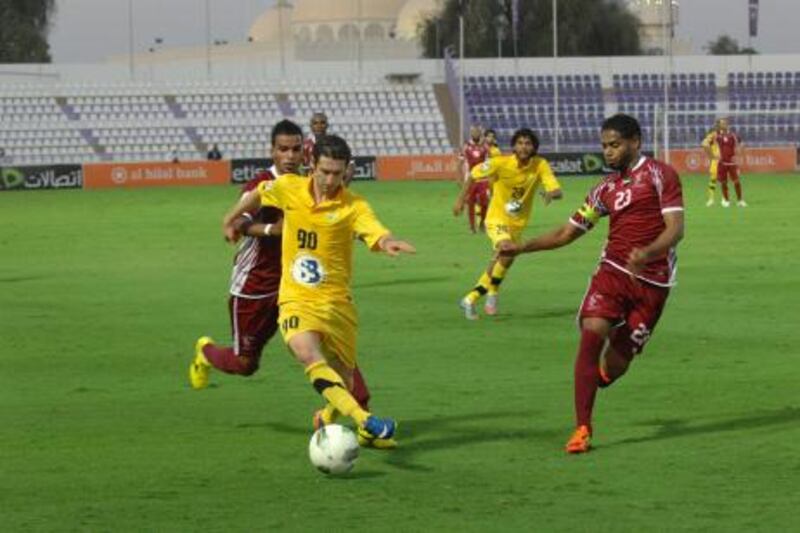If one moment could define Mohammed Reza Khalatbari, it would have been in the final seconds of Iran's friendly against Russia in Abu Dhabi last February.
Receiving the ball on the left, he darted into the box, sidestepped one Russian defender and then another, and weaved away from a third before flicking home on the run. Delirious with joy, he ran towards the stands, taking off his jersey and waving it over his head.
The celebration earned him his second yellow card of the game and he was sent marching off the field.
That moment encapsulates Khalatbari's ability to thrill and frustrate in equal measure.
With the ball at his feet, Al Wasl's new recruit is pure magic. Few in Iran, or even Asia, can match his skills or technical abilities.
His sudden burst of pace can leave opponents chasing shadows, one-on-one he can be a nightmare for defenders.
For fans of Iran, Khalatbari is the "King of Zob Ahan", a club where he played for five seasons and was a key figure in their run to the AFC Champions League final in 2010.
He has been compared to the Iranian legend Khodadad Azizi, the 1996 Asian Player of the Year, who went on to play for FC Cologne in Germany after his performances at the 1996 Asian Cup.
His most zealous fans often describe Khalatbari as the "Iranian Messi" and most commentators believe he is indispensable for the national team at present.
The officials at the Qatari club Al Gharafa, perhaps, might not agree with all the adulation, having replaced Khalatbari, after only six months and eight appearances, with the veteran Iranian striker Farhad Majidi.
But Diego Maradona must rate Khalatbari highly as the Argentine coach has lured him to Dubai to help to try to turn things around at the Zabeel Stadium.
"Reza is an exceptionally talented player and has the experience and skills that will help add value to the team," Marwan bin Bayat, the Wasl chairman, said after announcing the six-month deal.
"We are pleased to have him join us and we hope he adapts quickly and integrates into the team swiftly."
To get the nod from Maradona ranks high among Khalatbari's greatest moments as yet.
"It is an honour to work under Diego Maradona and it still feels like a dream, but I'm here to work hard and try to quickly gain a starting spot and win the confidence of the fans, management and, of course, the coach," Khalatbari said.
Yet, many of his fans would rather have seen him play among the elite in Spain than the Pro League. Khalatbari, 28, confesses that he dreams of moving to the Primera Liga one day.
Had Iran qualified for the 2010 World Cup, he could have been there already, but now his hopes rest on the Team Melli's 2014 campaign.
Playing for Maradona will also help him get the right exposure. Of course, his stint at Wasl will also allow the Iranian to work on some of his mental frailties.
As his celebration against Russia suggests, Khalatbari has an emotional side that gets him into trouble on the pitch.
His critics claim he often takes centre stage like a leading man but sometimes fluffs his lines, just like he did on Tuesday night on his Wasl debut, spooning the ball over the bar from just six yards.
"Khalatbari has plenty of potential and ability," said an Iranian commentator recently. "But he can be frustrating and a player who is always liable to be sent off due to his immature behaviour.
"He is one of those players or people who always have one of their 10 fingers on the self-destruct button. Not incredibly reliable, but tremendously talented … he is a dangerous Speedy Gonzalez."
Perhaps, Maradona can help calm the tempestuous side of his nature. They seem to share a similar background. The Argentine legend grew up in Villa Fiorito, a shanty town on the outskirts of Buenos Aires, Khalatbari was born in Ramsar, a city of just over 30,000 people on the coast of the Caspian Sea.
Born in 1983, when the Iran-Iraq war was at its peak, Khalatbari's family was short of money. But they still supported his enthusiasm.
He faced a difficult choice - to pursue a career in football or get a regular job to support his parents. He stuck to sports, starting his career at Shamoushak in 2003 before moving a year later to Aboomoslem - a club that discovered Iranian players such as Reza Enayati, Mojtaba Jabari and Andranik Teymourian.
Khalatbari underwent his obligatory military service during the two years that he spent at Aboomoslem. His impressive performances for the club earned him a deal in 2006 with Zob Ahan, where he emerged as an elite player. Ali Daei gave him his international debut in 2008 and he has made 44 appearances for his country.
"I never thought I would make so much progress in football," Khalatbari once said in an interview. "I was not even sure if I could make a living out of it and my family had to support me in the beginning.
"So I thank God for where I have reached. I have played for the national team, which is a dream for any player, but I hope to go to Europe someday."
For the moment, Khalatbari is focused on impressing Maradona. A successful season playing with Wasl could be his ticket to the Primera Liga.





